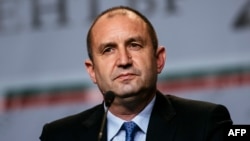Bulgarian PM resigns as pro-Russia general wins presidency
| Publisher | Radio Free Europe/Radio Liberty |
| Publication Date | 13 November 2016 |
| Cite as | Radio Free Europe/Radio Liberty, Bulgarian PM resigns as pro-Russia general wins presidency, 13 November 2016, available at: https://www.refworld.org/docid/5975a23fb.html [accessed 8 June 2023] |
| Disclaimer | This is not a UNHCR publication. UNHCR is not responsible for, nor does it necessarily endorse, its content. Any views expressed are solely those of the author or publisher and do not necessarily reflect those of UNHCR, the United Nations or its Member States. |
November 13, 2016
 Rumen Radev, candidate of the opposition Socialists, attends a news conference, in Sofia on November 6/
Rumen Radev, candidate of the opposition Socialists, attends a news conference, in Sofia on November 6/
Bulgarian Prime Minister Boyko Borisov has announced he will resign after Moscow-friendly Socialist party candidate Rumen Radev won the country's presidential election.
Borisov, of the center-right GERB party, told reporters on November 13 that he would formally offer his resignation on November 14 or 15 because "the [presidential election] results clearly show that the ruling coalition no longer holds the majority."
Bulgaria's Central Election Commission said on November 14 that Radev had won 59.4 percent of the votes to about 36 percent for GERB candidate Tsetska Tsacheva, the country's parliament speaker.
Borisov's resignation is likely to trigger early elections in the spring and risks plunging the NATO-member and EU-member country into renewed political turmoil just two years after Borisov took office for his second term.
Radev, a former general and chief of the Bulgarian Air Force, has never held a political office post.
Some observers say the surprise win could tilt Bulgaria back toward Russia as Radev has stated his opposition to maintaining economic sanctions against Russia.
Borisov, a former bodyguard, has been criticized for not cracking down on corruption and for dismal economic growth in Bulgaria, one of the poorest countries in the European Union.
The Bulgarian presidency is a largely ceremonial position, but the president can influence government policy.
Based on reporting by Reuters and TASS
Link to original story on RFE/RL website
